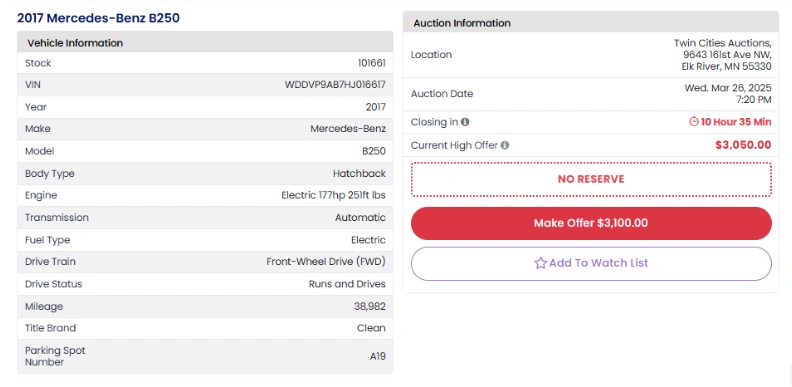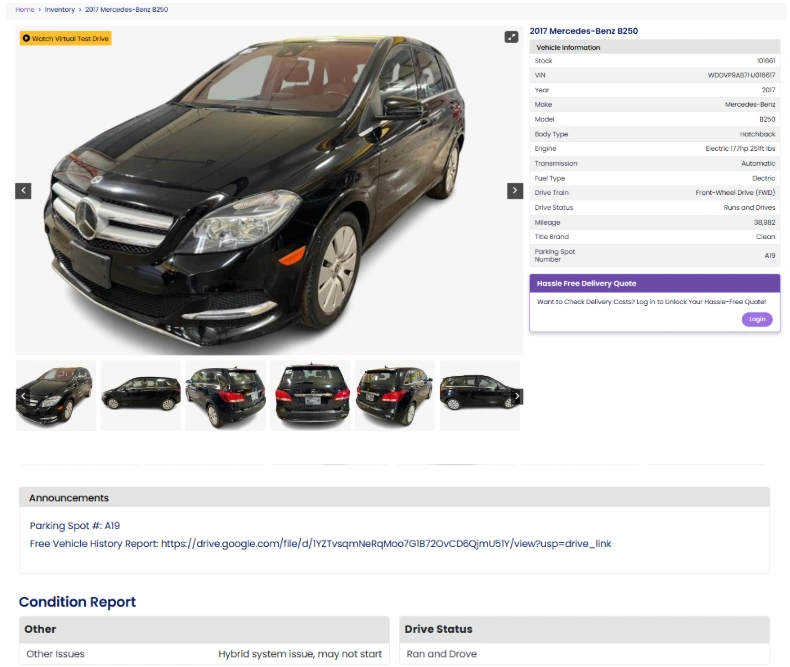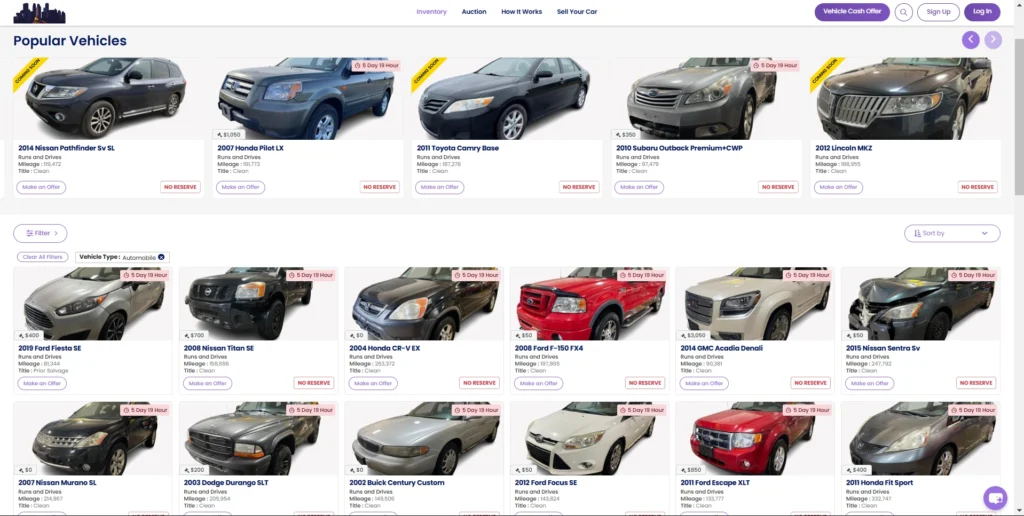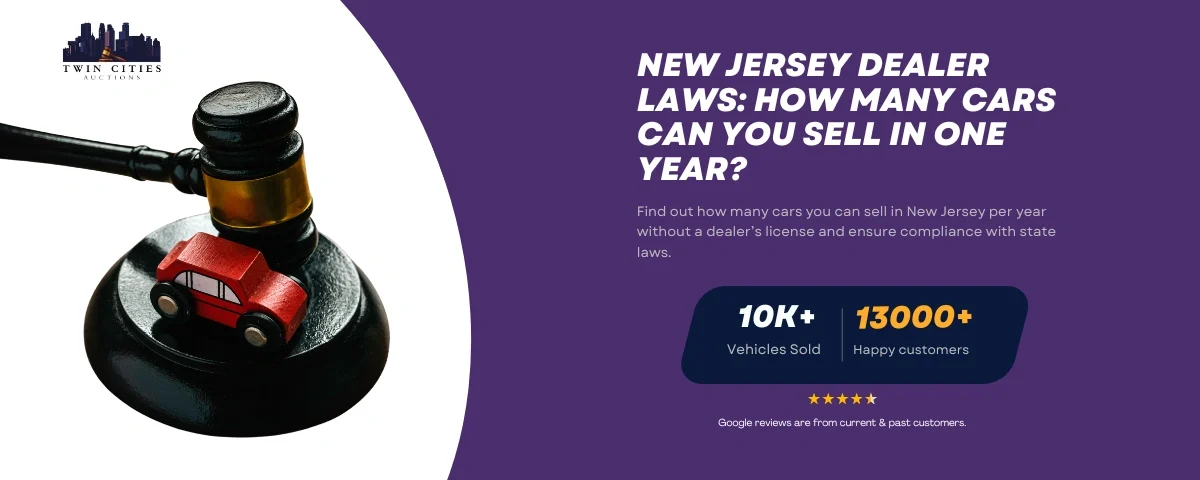Are you thinking of selling cars in New Jersey? Whether you’re a private seller looking to move a few vehicles or you want to break into the car sales business, understanding New Jersey’s dealer laws is crucial.
Did you know that selling too many cars without the proper license could result in fines or even legal trouble? In this article, we will discuss New Jersey’s dealer laws, licensing requirements, and how to legally navigate the car sales process to stay compliant.

Key Takeaways
- In New Jersey, you can sell up to 4 vehicles per year without needing a dealer’s license.
- Exceeding the 4-vehicle limit requires obtaining a dealer’s license from the New Jersey Motor Vehicle Commission (MVC).
- There are different types of dealer licenses in New Jersey, including those for new and used vehicle dealers.
- Auctions, such as Twin Cities Auctions, provide a great opportunity for buying and selling vehicles efficiently and legally.
- Staying compliant with New Jersey’s dealer laws will help protect your business and avoid costly penalties.
Understanding New Jersey Dealer Laws
New Jersey has strict regulations that govern how many vehicles you can sell as a private seller before you’re required to obtain a dealer’s license. Understanding these regulations is key to avoiding penalties and running a legitimate business.
In New Jersey, individuals or businesses that engage in the sale or lease of more than four motor vehicles per year are required to hold a New Jersey Motor Vehicle Dealer License. This requirement applies to both new and used vehicle dealers.
How Many Cars Can You Sell in New Jersey Without a Dealer’s License?
In New Jersey, you can sell up to 4 vehicles per year without the need for a dealer’s license. This applies to individuals selling their own cars.
However, if you sell more than four vehicles within a year, you are considered to be in the business of buying and selling cars and must obtain a dealer’s license. The New Jersey Motor Vehicle Commission (MVC) requires individuals exceeding the four-vehicle threshold to apply for a dealer’s license.
This limit exists to distinguish between hobbyists who occasionally sell cars and professional dealers who are conducting business. If you plan to sell more than four cars annually, it’s crucial to follow the proper legal procedures and obtain a license to avoid legal trouble and fines.
Dealer Licensing Requirements in New Jersey
If you plan on selling more than four cars per year in New Jersey, obtaining a dealer’s license is mandatory. The licensing process can be a bit complex, but it’s essential for operating a legitimate business.
Types of Dealer Licenses in New Jersey
New Jersey offers several types of dealer licenses depending on the scope of your business:
- New Car Dealer License: Required for businesses selling new vehicles under a manufacturer’s franchise agreement.
- Used Car Dealer License: Required for businesses selling used vehicles.
- Wholesale Dealer License: For businesses involved in selling vehicles to other dealers rather than the public.
- Leasing Dealer License: For businesses that lease vehicles.
Application Process
To apply for a dealer’s license in New Jersey, the following steps must be completed:
- Complete the Application: Submit the necessary forms to the New Jersey Motor Vehicle Commission.
- Proof of Location: A physical location is required, and it must meet local zoning and regulatory requirements.
- Background Check: Applicants must undergo a criminal background check and provide fingerprinting.
- Pre-Licensing Course: A pre-licensing course is mandatory for new dealers in New Jersey to ensure they understand state laws.
- Insurance Requirements: Dealers are required to obtain proper insurance coverage for their operations.
- Fees: Pay the applicable application and licensing fees to the MVC.
Types of Dealer Licenses in New Jersey
| License Type | Description | Requirements |
| New Car Dealer License | For selling new vehicles under a manufacturer’s franchise. | Franchise agreement, proof of location. |
| Used Car Dealer License | For selling used vehicles to the public. | Proof of location, background check. |
| Wholesale Dealer License | For selling vehicles to other dealers. | Proof of location, dealer registration. |
| Leasing Dealer License | For businesses that lease vehicles. | Proof of location, leasing agreement. |
Market Insights on New Jersey Car Sales
New Jersey has a thriving car sales market, driven by its large population and proximity to major metropolitan areas like New York City and Philadelphia. The demand for both new and used vehicles remains high, making it an attractive state for car dealerships.
Factors Driving New Jersey’s Car Market
- Proximity to Major Cities: New Jersey’s location near major urban centers increases the demand for vehicles, especially in the used car market.
- Population Density: The state’s dense population creates a steady demand for vehicles, making it an ideal market for car sales.
- Economic Growth: As New Jersey’s economy continues to grow, more people are purchasing vehicles for personal use or business purposes.
Key Drivers of New Jersey’s Car Market
| Market Factor | Impact on Vehicle Sales |
| Proximity to Major Cities | Increased demand for vehicles in urban areas like NYC and Philly. |
| Population Growth | Growing population results in higher demand for cars. |
| Economic Growth | As the economy grows, more consumers purchase new and used vehicles. |
Why Auctions Are a Smart Choice for Vehicle Sales
Selling cars through auctions is an excellent way to quickly move inventory and reach a wide audience. Auctions like Twin Cities Auctions offer a reliable platform for buying and selling vehicles in New Jersey and beyond.
Advantages of Using Twin Cities Auctions
- Competitive Pricing: Auctions like Twin Cities Auctions allow sellers to set a competitive price and reach a broad pool of buyers.

- Transparency: Every vehicle listed at the auction comes with detailed information, making the buying process transparent for both parties.

- Wide Inventory: Auctions have a large variety of vehicles available

- Quick Turnaround: Auctions offer fast and efficient sales, helping sellers move inventory quickly.
Why Choose Twin Cities Auctions
| Feature | Twin Cities Auctions | Traditional Dealership Sales |
| Pricing | Competitive auction pricing | Fixed pricing, often higher |
| Inventory | Wide variety of vehicles | Limited to dealership stock |
| Transparency | Detailed vehicle history and condition reports | Varies by dealership |
| Convenience | Fast and efficient vehicle transactions | Longer sales cycles |
| Reach | Attracts a broad national and local buyer base | Limited to local buyers |
Practical Tips for Sellers and Dealers
When selling vehicles in New Jersey, there are a few important things to keep in mind to stay compliant with the state’s dealer laws and maximize sales opportunities.
- Track Your Sales: Keep accurate records of each sale, including the vehicle’s VIN, sale price, and buyer information.
- Know the Limits: Be aware of the limit for selling cars in New Jersey. If you plan to sell more than four cars in a year, apply for a dealer’s license.
- Consider Using Auctions: Auctions provide an opportunity to spot a great deal which can be useful for sellers looking to buy vehicles to resell in New Jersey.
- Stay Informed: Keep up with market trends and adjust your inventory based on what types of cars are in demand.
Your Next Car is Just a Click Away at Twin Cities Auctions!
Twin Cities Auctions brings the excitement of car auctions directly to your screen. No dealer license? No problem! Our online platform is open to the public, offering a wide range of vehicles to suit all tastes and budgets.
Whether you are an automotive enthusiast or a first-time buyer, you’ll find an impressive variety of vehicles that cater to all tastes and budgets. From reliable family sedans and eco-friendly hybrids to high-performance cars and premium SUVs, our listings are curated to ensure quality and diversity.
Enjoy a hassle-free bidding process and secure your perfect match from our extensive lineup. Don’t miss out—your next car is just a click away at Twin Cities Auctions!
Looking for more options? Explore our comprehensive list of all available car auctions across the United States. Your next deal might be just a click away!
FAQ
How many cars can I sell in New Jersey without a dealer’s license?
In New Jersey, you can sell up to four vehicles per year without needing a dealer’s license. If you sell more than four vehicles, you must apply for a dealer’s license from the New Jersey Motor Vehicle Commission.
What are the requirements for a dealer’s license in New Jersey?
To obtain a dealer’s license in New Jersey, you need to complete the application, submit a criminal background check, provide proof of a physical location, complete a pre-licensing course, and pay the necessary fees.
Can I sell cars at an auction in New Jersey?
Yes, selling cars at an auction in New Jersey is a great way to reach a larger audience. Auctions like Twin Cities Auctions offer transparency, competitive pricing, and fast transactions.
What types of dealer licenses are available in New Jersey?
New Jersey offers several types of dealer licenses, including new car dealer, used car dealer, wholesale dealer, and leasing dealer licenses, depending on your business.
How do I apply for a dealer’s license in New Jersey?
To apply for a dealer’s license in New Jersey, you must complete the necessary forms, provide proof of location, undergo a background check, complete a pre-licensing course, and pay the required fees.
Why should I choose Twin Cities Auctions for selling cars?
Twin Cities Auctions provides a competitive platform for buying and selling vehicles. They offer transparent vehicle condition reports, fast transactions, and a wide audience of potential buyers.
Do I need to register each vehicle I sell in New Jersey?
Yes, each vehicle sold in New Jersey must be registered with the New Jersey Motor Vehicle Commission.
How do I renew my dealer’s license in New Jersey?
Dealer licenses in New Jersey are valid for one year and must be renewed annually. You will need to submit updated paperwork and pay the renewal fee to maintain your license.


